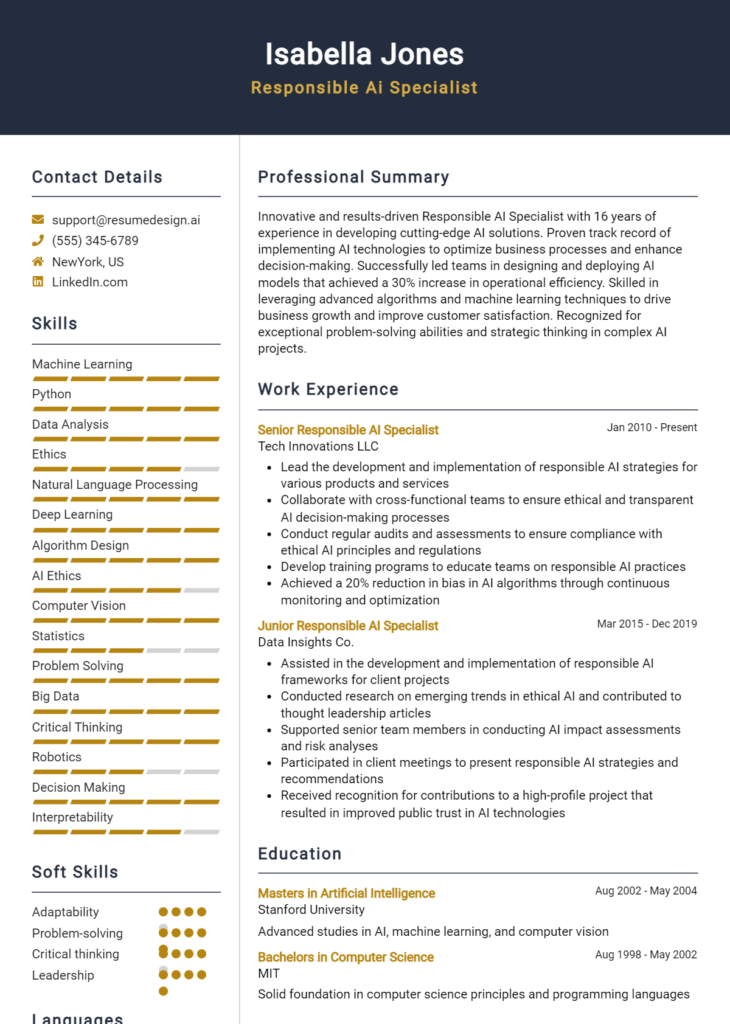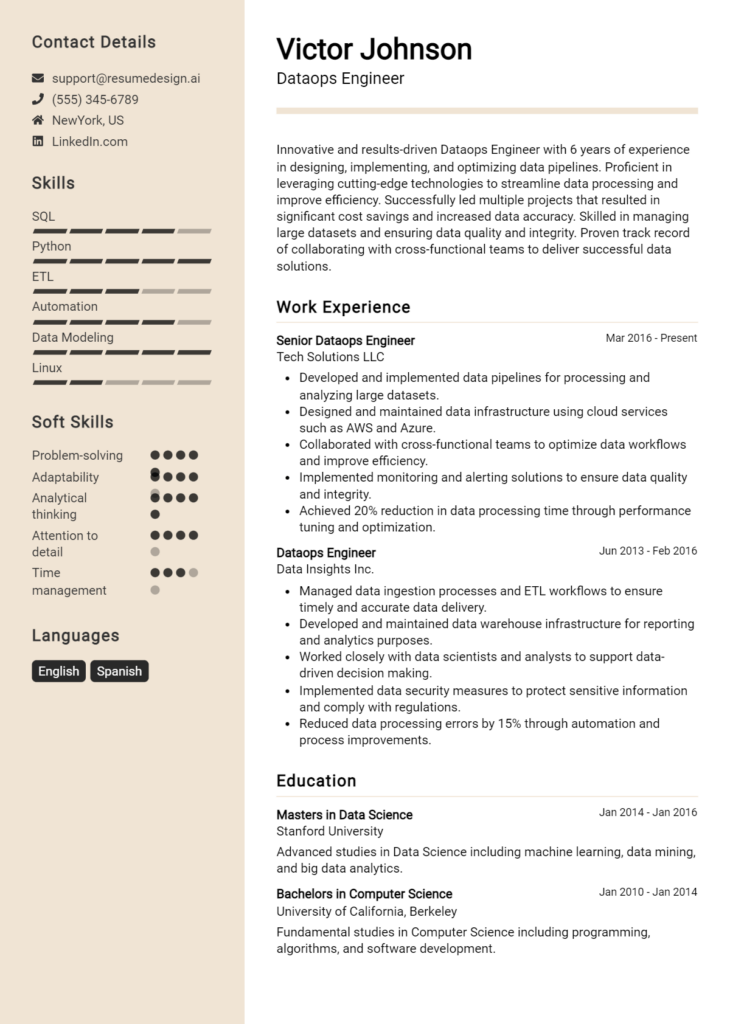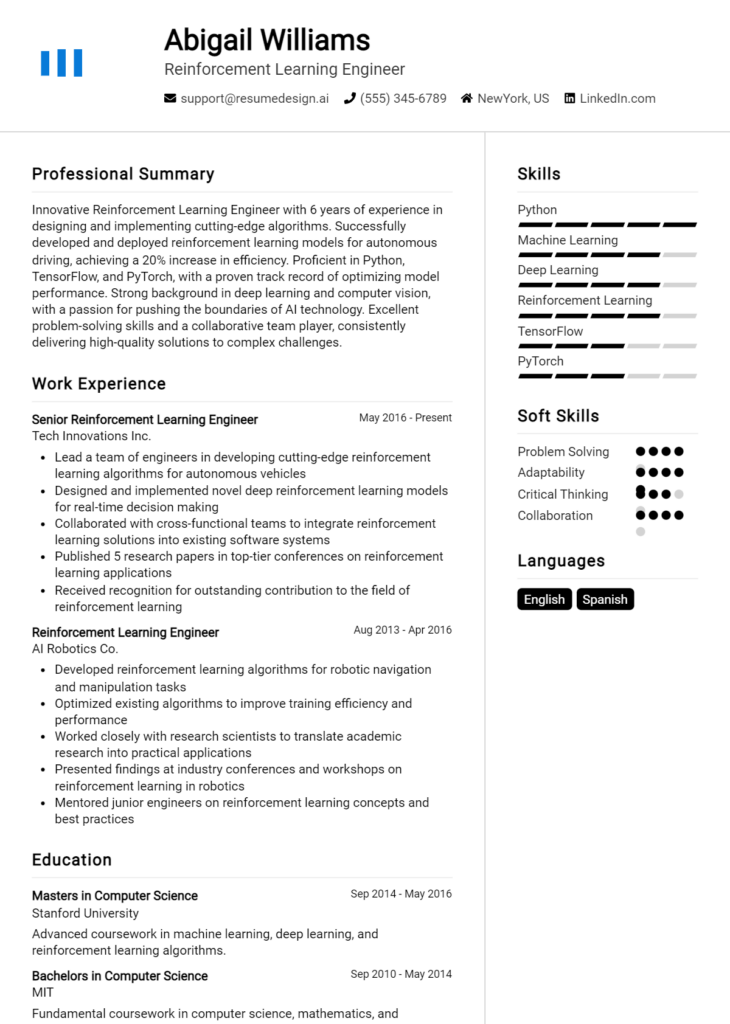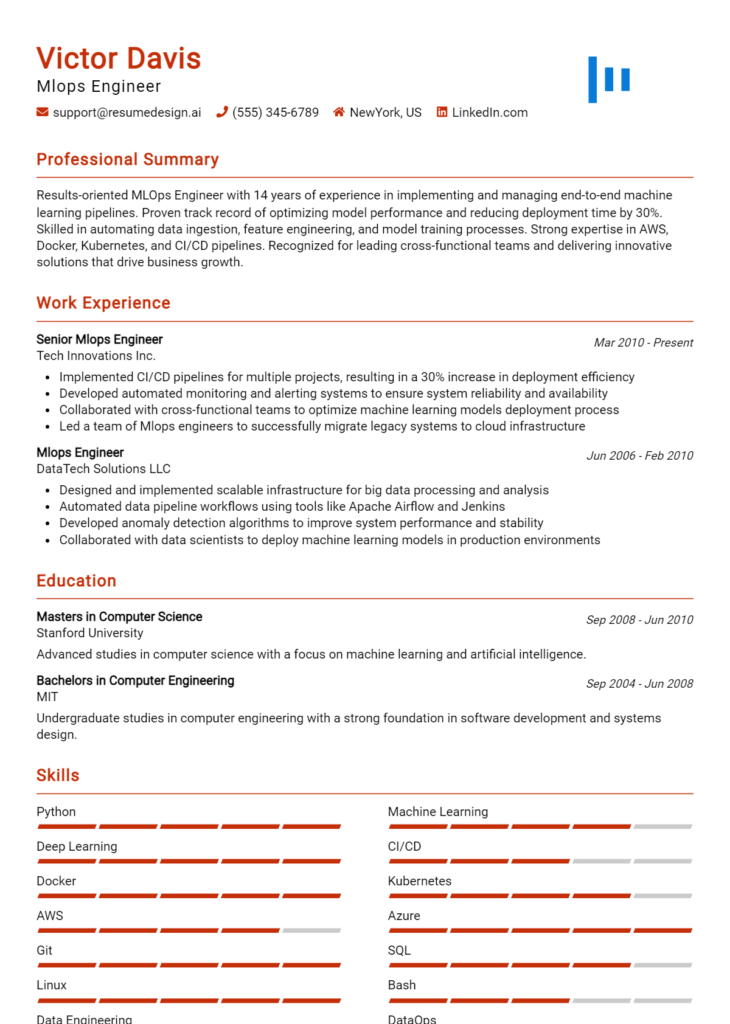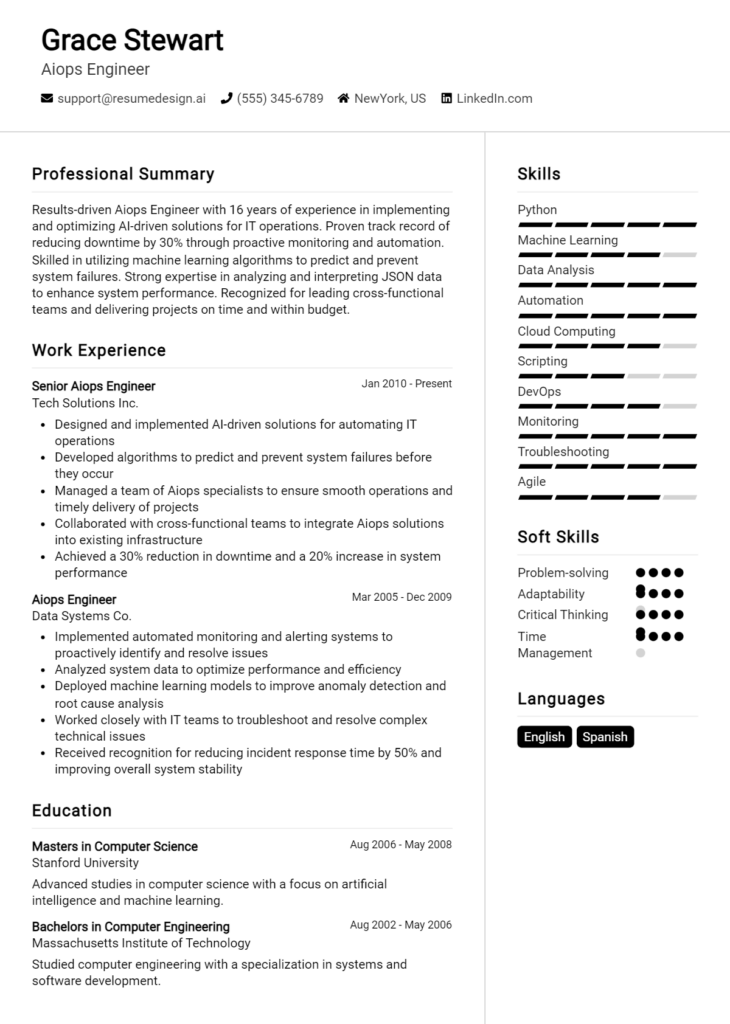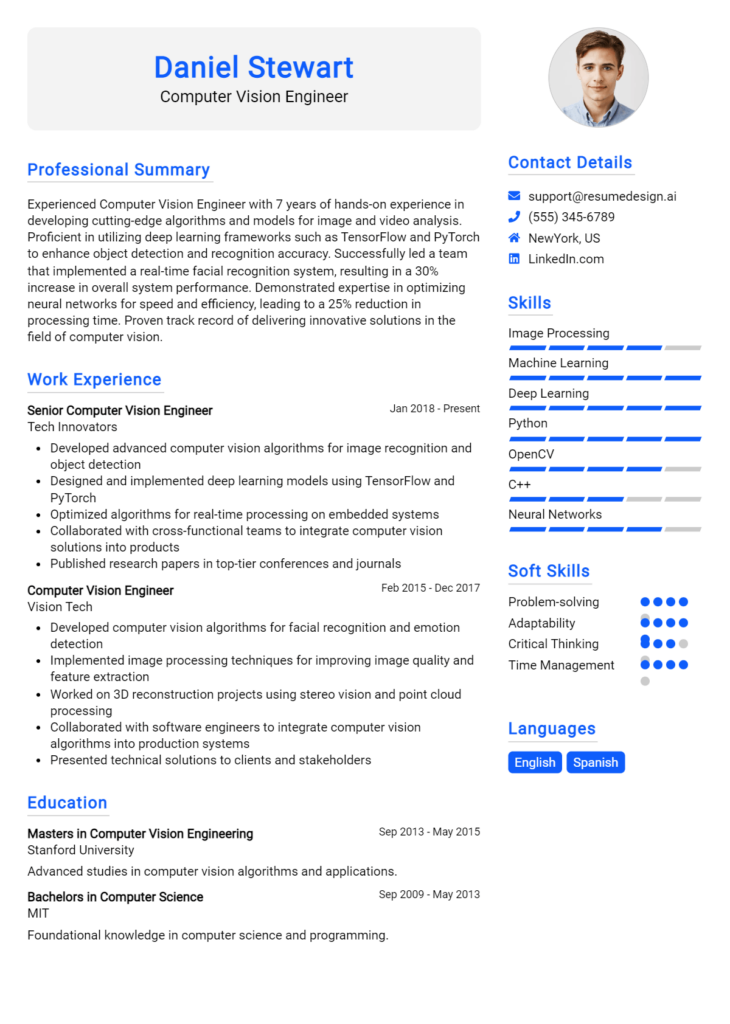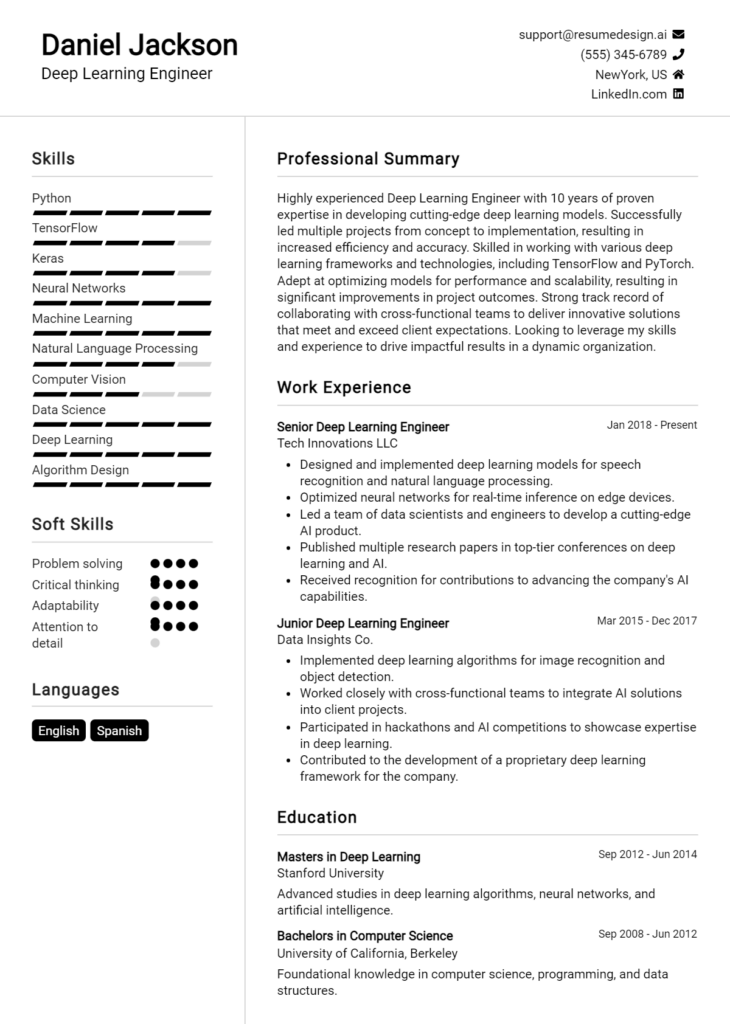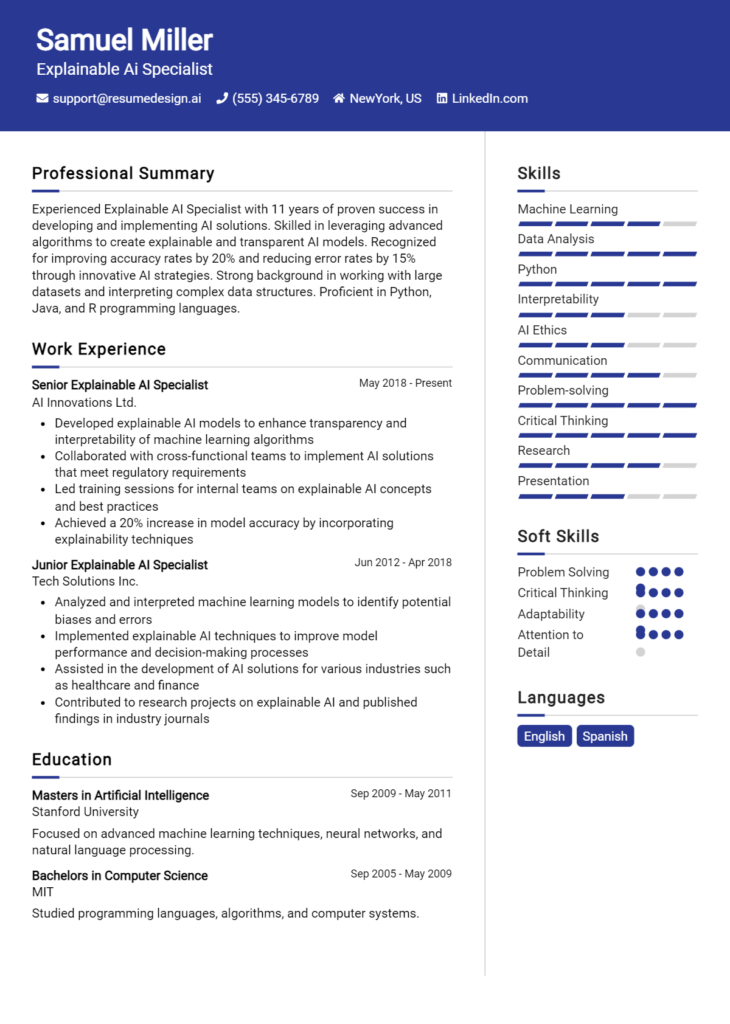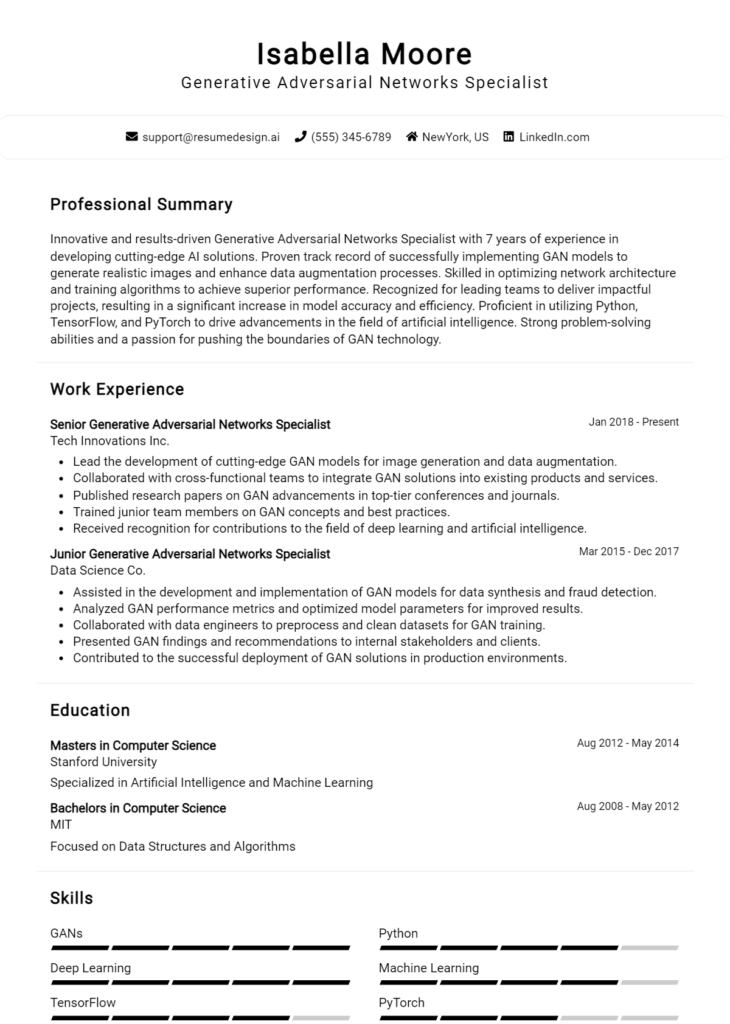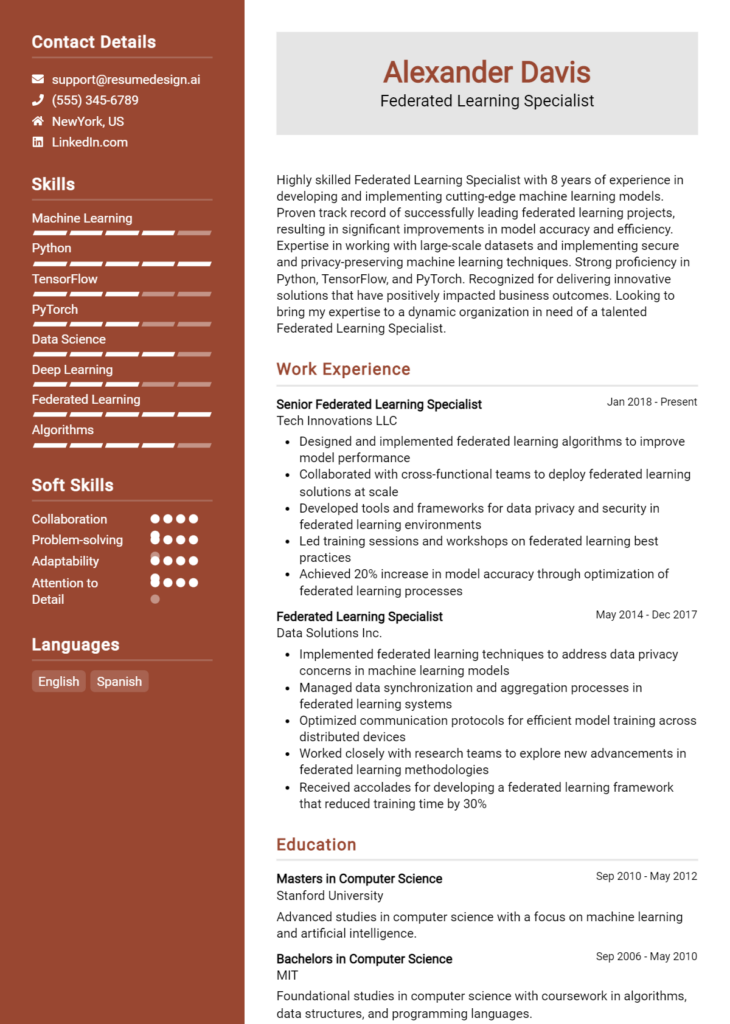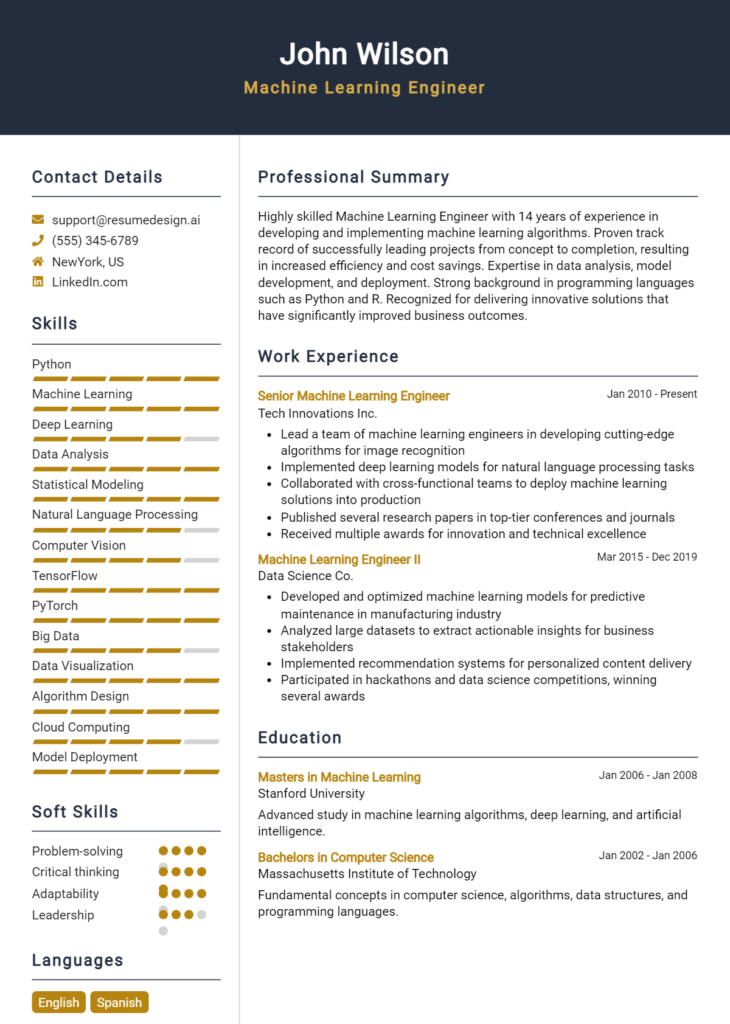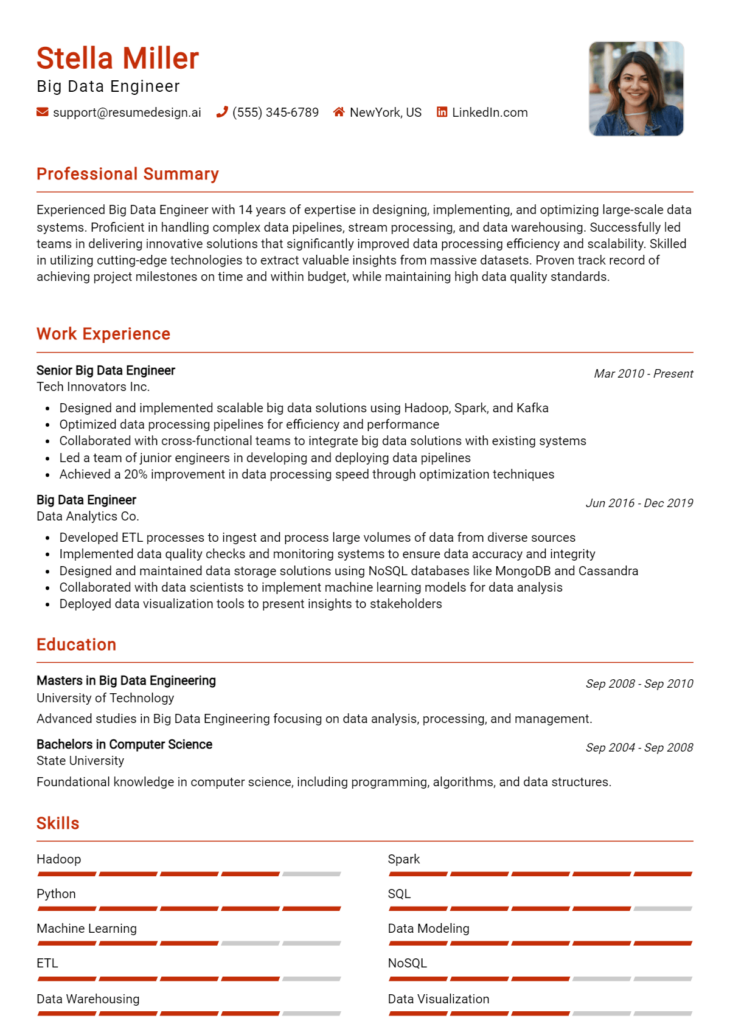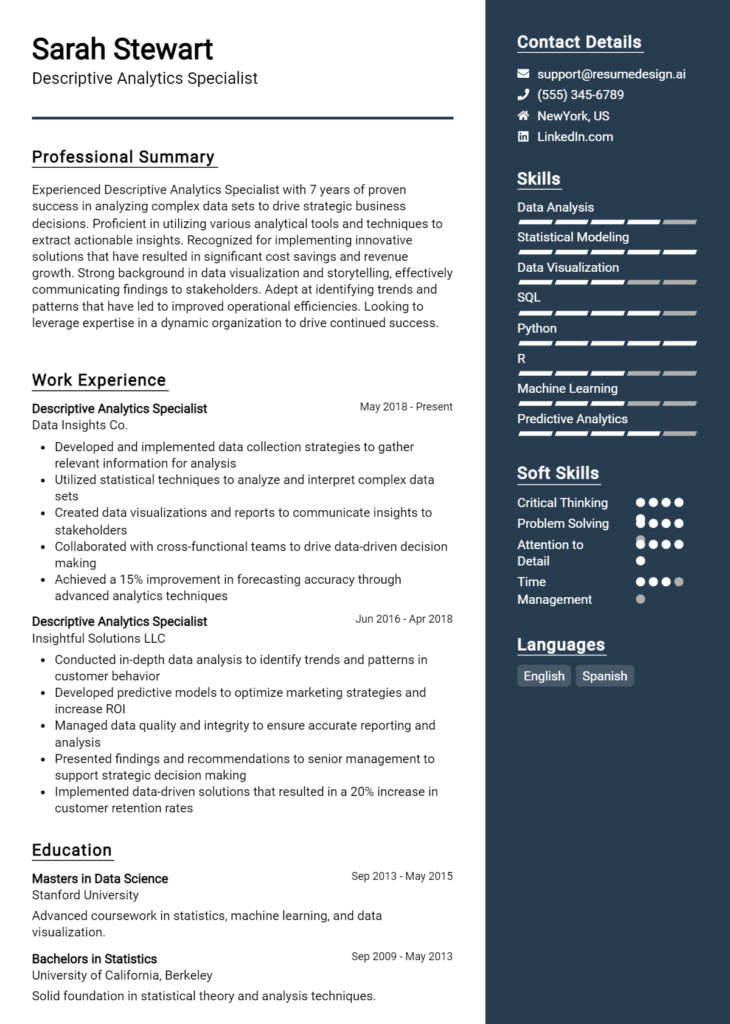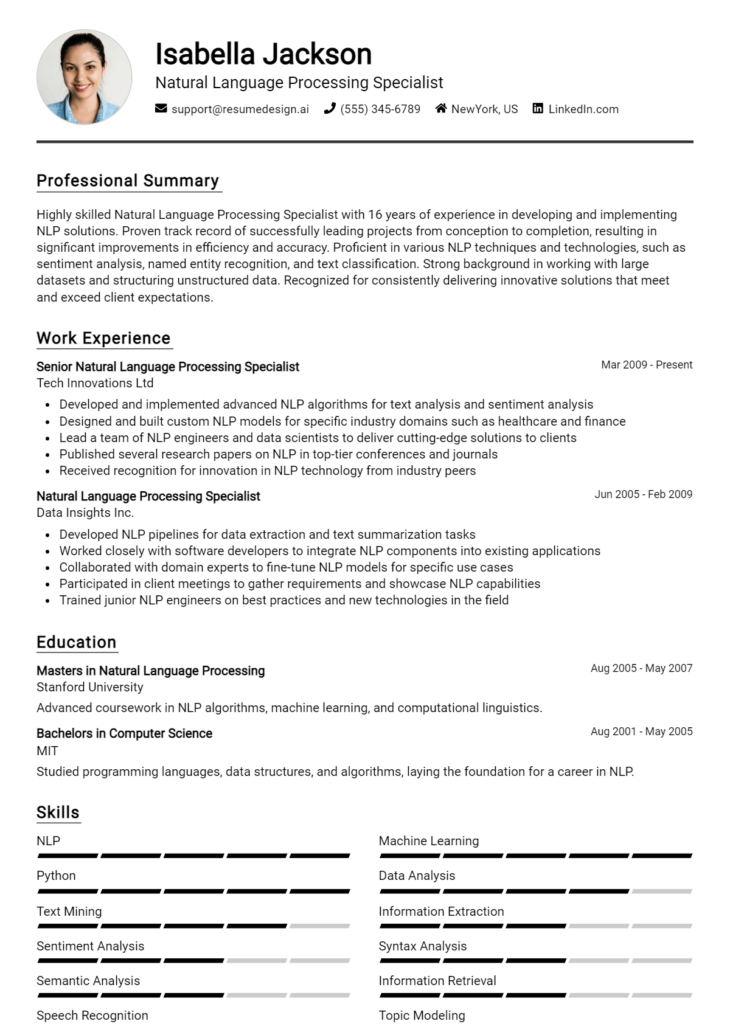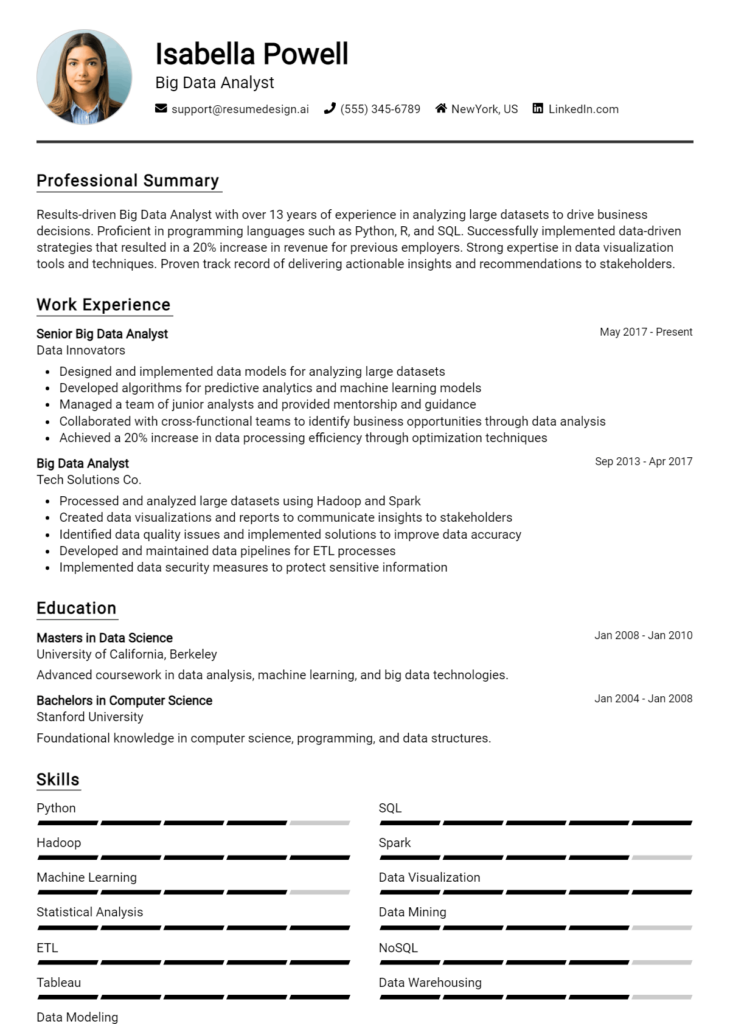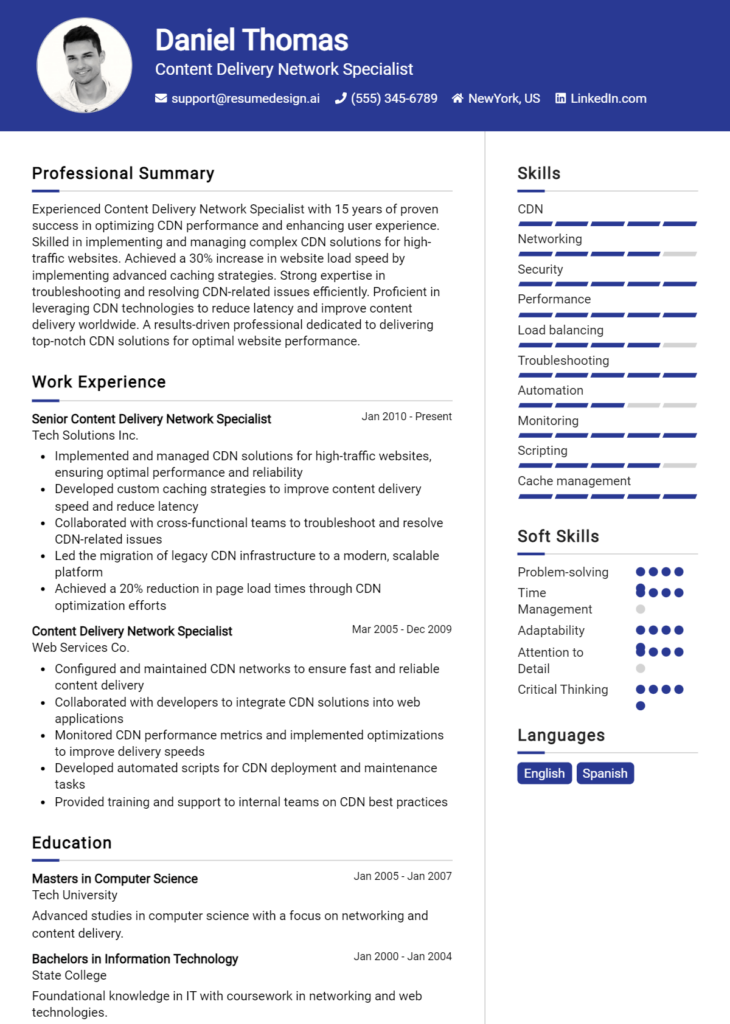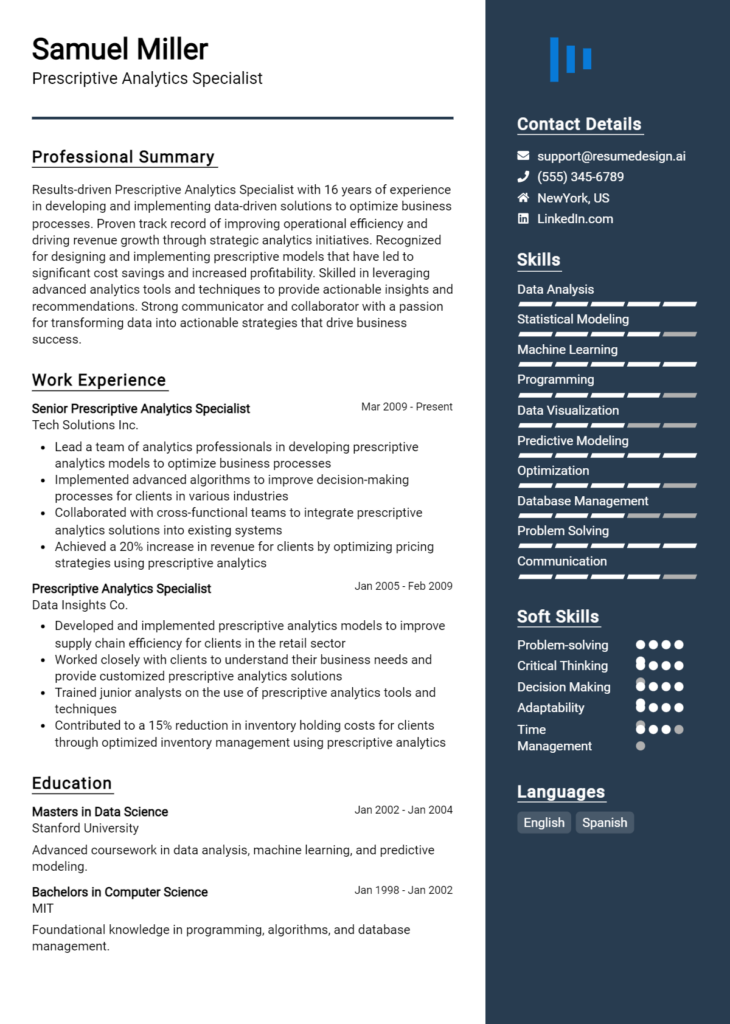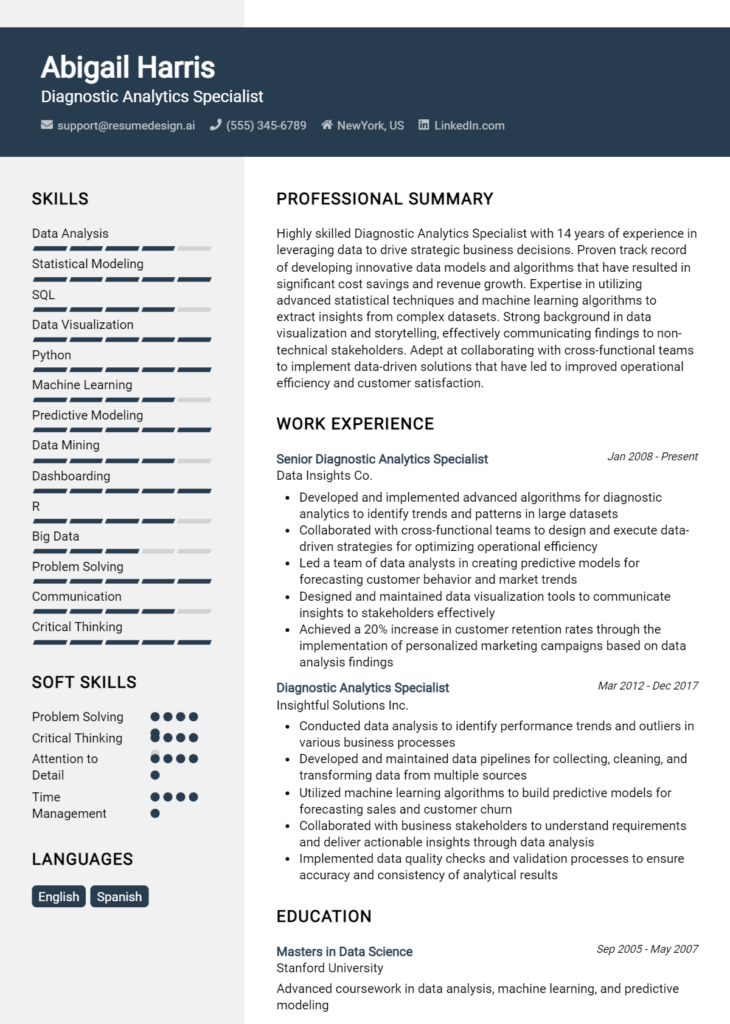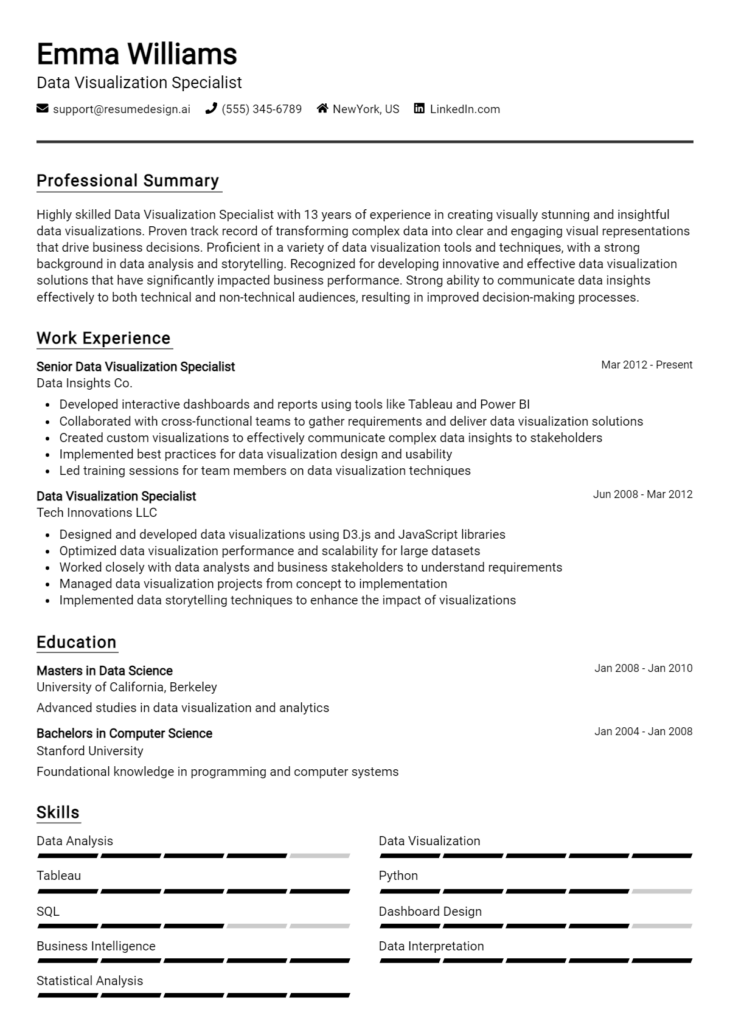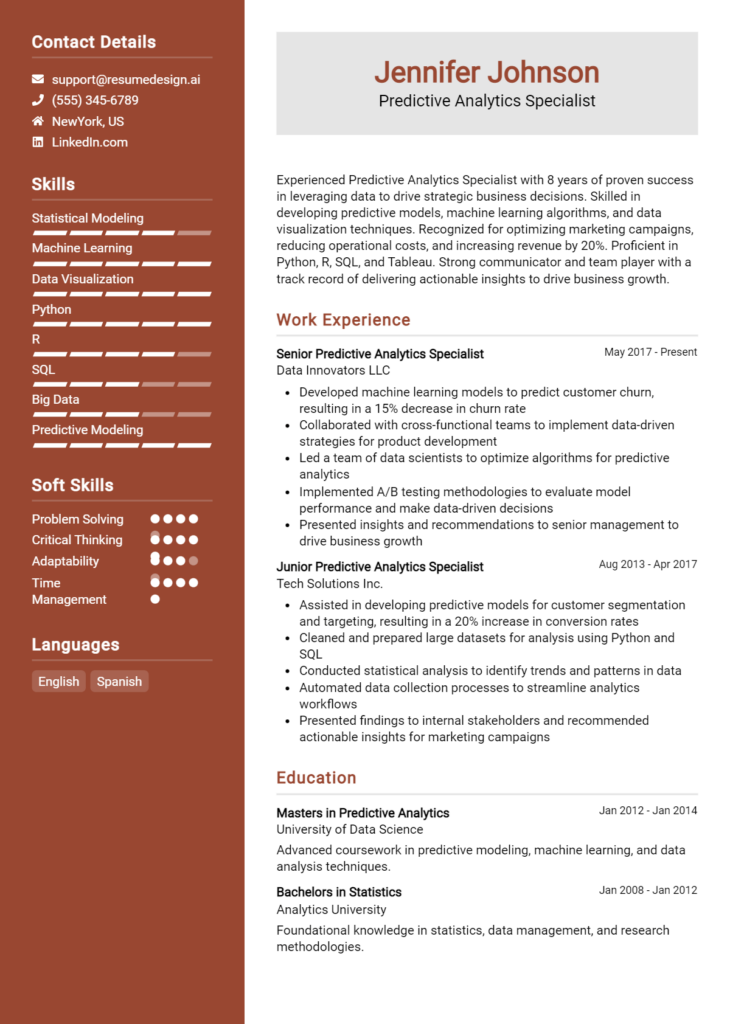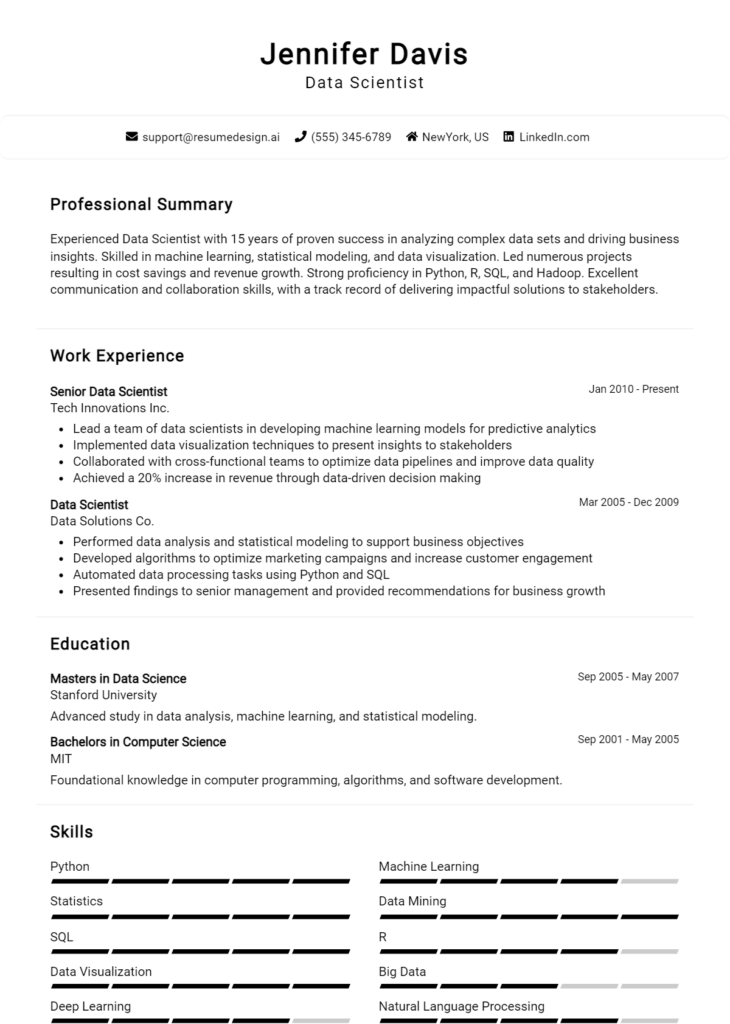Business Intelligence Analyst Core Responsibilities
A Business Intelligence Analyst plays a crucial role in bridging various departments by transforming data into actionable insights. This position requires strong technical skills in data analysis and visualization tools, combined with operational knowledge to understand business processes. Problem-solving abilities are essential to identify trends and recommend strategic improvements. These competencies not only facilitate informed decision-making but also align with organizational goals. A well-structured resume highlighting these qualifications can significantly enhance a candidate's appeal in the job market.
Common Responsibilities Listed on Business Intelligence Analyst Resume
- Analyze and interpret complex data sets to identify trends and patterns.
- Develop and maintain dashboards and reports for stakeholders.
- Collaborate with cross-functional teams to gather business requirements.
- Design and implement data models to support business strategies.
- Conduct data quality assessments and recommend improvements.
- Present findings and recommendations to management and other stakeholders.
- Monitor key performance indicators (KPIs) to track business performance.
- Utilize data visualization tools to communicate insights effectively.
- Ensure compliance with data governance and security policies.
- Stay updated on industry trends and best practices in business intelligence.
- Assist in training team members on BI tools and methodologies.
High-Level Resume Tips for Business Intelligence Analyst Professionals
A well-crafted resume is crucial for Business Intelligence Analyst professionals, as it serves as the first impression a candidate makes on potential employers. In a field that relies heavily on data analysis and insights, your resume must clearly reflect your skills, achievements, and the value you can bring to an organization. A strong resume not only highlights your technical proficiency but also showcases your analytical mindset and problem-solving abilities. This guide will provide practical and actionable resume tips specifically tailored for Business Intelligence Analyst professionals, ensuring you stand out in a competitive job market.
Top Resume Tips for Business Intelligence Analyst Professionals
- Tailor your resume for each job application by aligning your skills and experiences with the specific requirements mentioned in the job description.
- Highlight relevant experience, focusing on roles that involved data analysis, reporting, or business intelligence tools.
- Quantify your achievements with metrics and data; for example, mention how you improved reporting accuracy by X% or increased data processing speed.
- Include industry-specific skills such as proficiency in SQL, Tableau, Power BI, or other relevant data visualization and analysis tools.
- Showcase your understanding of data governance and data quality practices, as these are essential in BI roles.
- Incorporate keywords from the job posting to ensure your resume passes through Applicant Tracking Systems (ATS) and reaches hiring managers.
- Emphasize your ability to communicate complex data insights to non-technical stakeholders, highlighting your storytelling and presentation skills.
- Keep your resume concise and organized, ideally one page, focusing on the most relevant information to capture the employer's attention quickly.
- Consider including a summary statement at the top of your resume that encapsulates your experience, skills, and career objectives in the BI field.
By implementing these tips, you can significantly increase your chances of landing a job in the Business Intelligence Analyst field. A targeted and well-structured resume will not only demonstrate your qualifications but also convey your proactive approach to potential employers, setting you apart from other candidates in the competitive landscape of business intelligence.
Why Resume Headlines & Titles are Important for Business Intelligence Analyst
In the competitive field of Business Intelligence, a well-crafted resume is essential for standing out to hiring managers. A strong resume headline or title serves as the first impression, immediately grabbing attention and summarizing a candidate's key qualifications in a single impactful phrase. This concise and relevant statement not only reflects the applicant's experience and skills but also aligns directly with the job being applied for, ensuring that it resonates with the specific needs of the employer. A compelling headline can make the difference between a hiring manager choosing to read further or moving on to the next candidate.
Best Practices for Crafting Resume Headlines for Business Intelligence Analyst
- Keep it concise: Limit your headline to a few powerful words that convey your expertise.
- Be role-specific: Tailor your headline to align with the specific Business Intelligence Analyst position you are applying for.
- Highlight key skills: Include critical skills that are relevant to the job, such as data analysis, visualization, or reporting.
- Use impactful language: Choose strong action verbs and assertive adjectives that showcase your capabilities.
- Avoid jargon: Use clear and straightforward language that can be easily understood by all hiring professionals.
- Incorporate measurable achievements: If possible, include quantifiable results that demonstrate your impact in previous roles.
- Reflect your professional brand: Ensure your headline aligns with your overall personal branding and career goals.
- Revise for relevance: Update your headline for each application to ensure it is tailored to the specific job description.
Example Resume Headlines for Business Intelligence Analyst
Strong Resume Headlines
"Data-Driven Business Intelligence Analyst with 5+ Years in E-Commerce Analytics"
"Expert BI Analyst Specializing in Predictive Analytics and Data Visualization"
“Results-Oriented Business Intelligence Professional with Proven Success in Enhancing Decision-Making Processes”
“Detail-Oriented Analyst with a Track Record of Driving Business Insights Through Advanced Data Analysis”
Weak Resume Headlines
“Business Intelligence Analyst”
“Seeking Opportunities in Data Analysis”
The strong resume headlines are effective because they are specific, highlight relevant expertise, and showcase measurable achievements that directly relate to the role of a Business Intelligence Analyst. They immediately communicate the candidate’s value to potential employers. In contrast, the weak headlines lack specificity and impact, failing to convey any unique qualifications or strengths, which can lead to missed opportunities in a competitive job market.
Writing an Exceptional Business Intelligence Analyst Resume Summary
A resume summary is a crucial component for a Business Intelligence Analyst as it serves as the first impression a hiring manager will have of a candidate. A well-crafted summary quickly captures attention by highlighting key skills, relevant experience, and noteworthy accomplishments that align with the job requirements. It should be concise and impactful, effectively conveying the candidate's unique value proposition while being tailored to the specific position they are applying for. In a competitive job market, a strong resume summary can differentiate a candidate and set the tone for the rest of the application.
Best Practices for Writing a Business Intelligence Analyst Resume Summary
- Quantify Achievements: Use numbers and metrics to demonstrate the impact of your work.
- Focus on Skills: Highlight specific technical and analytical skills relevant to the role.
- Tailor for the Job Description: Customize your summary to reflect the keywords and requirements of the job listing.
- Keep it Concise: Aim for 3-5 sentences that deliver your message clearly and quickly.
- Showcase Relevant Experience: Include only the most pertinent experiences that align with the position.
- Use Action Verbs: Start sentences with strong action verbs to convey proactivity and effectiveness.
- Highlight Soft Skills: Don’t forget to mention interpersonal skills that aid in collaboration and communication.
- Proofread: Ensure there are no spelling or grammatical errors, as these can undermine professionalism.
Example Business Intelligence Analyst Resume Summaries
Strong Resume Summaries
Results-driven Business Intelligence Analyst with over 5 years of experience in data analysis and visualization. Proven track record of increasing operational efficiency by 30% through the development of interactive dashboards and reports. Proficient in SQL, Tableau, and Python, with a strong ability to translate complex data into actionable insights.
Detail-oriented Business Intelligence Analyst with expertise in predictive analytics and data mining. Successfully led a project that reduced customer churn by 15% by implementing targeted marketing strategies based on data-driven insights. Skilled in utilizing R and Power BI to deliver compelling data narratives.
Experienced Business Intelligence Analyst with a focus on financial performance metrics. Achieved a 25% increase in revenue through data-driven decision-making and strategic KPI development. Adept at collaborating with cross-functional teams to enhance data accessibility and reporting efficiency.
Weak Resume Summaries
Business Intelligence Analyst with experience in data analysis and reporting. I have worked on various projects and have some skills in Excel and SQL.
Motivated individual seeking a position as a Business Intelligence Analyst. I am interested in data and have some knowledge of analytics tools.
The examples of strong resume summaries are effective because they are specific, quantify achievements, and directly relate to the skills required for the Business Intelligence Analyst role. They provide concrete evidence of the candidate's abilities and successes, making them stand out to hiring managers. In contrast, the weak summaries are vague, lacking specific outcomes and quantifiable results, making it difficult for employers to gauge the candidate's true potential and fit for the position.
Work Experience Section for Business Intelligence Analyst Resume
The work experience section of a Business Intelligence Analyst resume is vital as it effectively highlights the candidate's technical skills, team management capabilities, and the ability to deliver high-quality products. This section serves as a showcase for potential employers, demonstrating how the candidate has applied their knowledge in real-world scenarios, driven results, and contributed to their teams. By quantifying achievements and aligning experiences with industry standards, candidates can present a compelling narrative that underscores their qualifications and readiness for the role.
Best Practices for Business Intelligence Analyst Work Experience
- Clearly outline your technical expertise, including tools and technologies used (e.g., SQL, Tableau, Power BI).
- Quantify achievements with specific metrics (e.g., reduced reporting time by 30% or increased data accuracy by 25%).
- Highlight projects that demonstrate your ability to lead teams and manage stakeholders effectively.
- Use action verbs to describe your contributions, emphasizing your role in successful initiatives.
- Align your experience with industry standards and best practices to show familiarity with current trends.
- Include collaborative projects to illustrate teamwork and communication skills.
- Tailor your experience to the job description, emphasizing relevant skills and achievements for each application.
- Keep descriptions concise and focused on outcomes rather than merely listing tasks.
Example Work Experiences for Business Intelligence Analyst
Strong Experiences
- Led a cross-functional team to implement a new BI tool that improved reporting efficiency by 40%, resulting in faster decision-making processes.
- Developed and maintained performance dashboards that provided real-time insights, contributing to a 15% increase in sales revenue over six months.
- Collaborated with IT and business units to streamline data integration processes, reducing data discrepancies by 30% and enhancing data reliability.
- Executed data analysis projects that identified customer trends, leading to the development of targeted marketing strategies and a 20% increase in customer engagement.
Weak Experiences
- Worked on various projects related to data analysis.
- Assisted in generating reports for management.
- Participated in team meetings to discuss BI requirements.
- Helped maintain databases and ensure data quality.
The examples provided are considered strong because they illustrate clear, quantifiable outcomes and specific contributions that demonstrate the candidate's technical expertise and leadership abilities. In contrast, the weak experiences lack specificity and measurable results, failing to convey the candidate's impact or skill level effectively. Strong experiences paint a vivid picture of the value the candidate can bring to a potential employer, while weak experiences leave much to be desired in terms of clarity and relevance.
Education and Certifications Section for Business Intelligence Analyst Resume
The education and certifications section of a Business Intelligence Analyst resume is crucial for showcasing the candidate's academic background, industry-relevant certifications, and dedication to continuous learning. This section serves as a testament to the analyst's commitment to mastering the necessary skills and knowledge required for the role. By detailing relevant coursework, certifications, and specialized training, candidates can significantly enhance their credibility and demonstrate their alignment with the job requirements, making them more competitive in the job market.
Best Practices for Business Intelligence Analyst Education and Certifications
- Focus on relevant degrees such as Bachelor's or Master's in Data Science, Business Analytics, or Information Technology.
- Include industry-recognized certifications like Certified Business Intelligence Professional (CBIP) or Microsoft Certified: Data Analyst Associate.
- Provide specific coursework that aligns with business intelligence tools and methodologies, such as SQL, data visualization, and statistical analysis.
- Highlight any ongoing education or professional development courses to demonstrate commitment to staying current in the field.
- Use clear and concise formatting to ensure easy readability and quick identification of qualifications.
- Prioritize the most recent and relevant certifications, placing them at the top of the list to draw attention.
- Consider including any specialized training programs that enhance skills in specific BI tools or technologies.
- Tailor the section to reflect the skills and knowledge that are most pertinent to the job description of the position being applied for.
Example Education and Certifications for Business Intelligence Analyst
Strong Examples
- Bachelor of Science in Data Analytics, University of XYZ, 2020
- Certified Business Intelligence Professional (CBIP), 2021
- Advanced Data Visualization Techniques, Coursera, 2022
- Master of Business Administration (MBA) with a concentration in Information Systems, University of ABC, 2023
Weak Examples
- Bachelor of Arts in History, University of DEF, 2015
- Certifications in Microsoft Office Suite, 2020
- High School Diploma, 2010
- Outdated Data Analysis Techniques Certification, 2018
The examples listed as strong demonstrate a direct relevance to the Business Intelligence Analyst role, featuring degrees and certifications that are aligned with current industry standards and practices. These qualifications reflect both foundational knowledge and specialized skills that are essential for success in business intelligence. Conversely, the weak examples indicate a lack of relevance to the position; they include degrees and certifications that do not contribute to the candidate's ability to perform in a business intelligence capacity, thereby undermining their credibility in the field.
Top Skills & Keywords for Business Intelligence Analyst Resume
In today's data-driven landscape, the role of a Business Intelligence Analyst is pivotal for organizations seeking to leverage data for strategic decision-making. Having a well-crafted resume that highlights the right skills can significantly enhance your chances of standing out to potential employers. The key to a successful Business Intelligence Analyst resume lies in effectively showcasing both hard and soft skills that demonstrate your analytical prowess, technical ability, and interpersonal effectiveness. By aligning your skills with the specific requirements of the position, you not only present yourself as a qualified candidate but also reflect your understanding of the industry's demands.
Top Hard & Soft Skills for Business Intelligence Analyst
Soft Skills
- Analytical Thinking
- Problem Solving
- Communication Skills
- Team Collaboration
- Adaptability
- Critical Thinking
- Attention to Detail
- Time Management
- Creativity
- Emotional Intelligence
- Stakeholder Management
- Presentation Skills
- Conflict Resolution
- Active Listening
- Decision-Making
Hard Skills
- Data Visualization Tools (e.g., Tableau, Power BI)
- SQL and Database Management
- Data Warehousing Concepts
- ETL (Extract, Transform, Load) Processes
- Statistical Analysis
- Microsoft Excel Proficiency
- Programming Languages (e.g., Python, R)
- Business Process Modeling
- Knowledge of BI Software (e.g., QlikView, Looker)
- Data Mining Techniques
- Cloud Computing (e.g., AWS, Azure)
- Predictive Analytics
- Machine Learning Basics
- Report Generation
- Data Governance and Compliance
- Dashboard Development
- Business Intelligence Frameworks
For more insights on how to effectively present your skills and work experience in your resume, consider exploring the resources available to enhance your job application strategy.
Stand Out with a Winning Business Intelligence Analyst Cover Letter
As a dedicated and results-driven Business Intelligence Analyst, I am excited to express my interest in the position at [Company Name]. With a solid background in data analysis, visualization, and strategic reporting, I am confident in my ability to turn complex data sets into actionable insights that drive business growth. My experience in utilizing various BI tools, including Tableau and Power BI, has equipped me with the skills to create interactive dashboards and reports that not only enhance decision-making processes but also foster collaboration across departments.
In my previous role at [Previous Company Name], I successfully led a project that streamlined our data reporting processes, resulting in a 30% reduction in the time taken to generate weekly reports. By implementing predictive analytics and KPI tracking, I was able to identify trends and opportunities that helped the management team make informed decisions, ultimately increasing our sales by 15% over two quarters. My strong analytical skills, combined with my ability to communicate findings clearly to stakeholders, position me well to contribute to [Company Name]’s goals.
I am particularly drawn to [Company Name] because of its commitment to leveraging data-driven strategies to enhance customer experience and operational efficiency. I am eager to bring my expertise in data mining, statistical analysis, and problem-solving to your team. I am also excited about the opportunity to collaborate with cross-functional teams to develop data-driven strategies that align with your organization’s vision.
Thank you for considering my application. I look forward to the possibility of discussing how my skills and experiences align with the goals of [Company Name]. I am enthusiastic about the chance to contribute to your team and help drive informed business decisions through insightful data analysis.
Common Mistakes to Avoid in a Business Intelligence Analyst Resume
When crafting a resume for a Business Intelligence Analyst position, it's crucial to avoid common pitfalls that can undermine your chances of landing an interview. A well-structured resume should effectively showcase your analytical skills, technical expertise, and experience in data-driven decision-making. However, many candidates often make mistakes that can detract from their qualifications. Here are some common mistakes to watch out for:
Lack of Quantifiable Achievements: Failing to include specific metrics or outcomes from past projects can make your contributions appear vague. Use numbers to highlight the impact of your work, such as "increased reporting efficiency by 30%."
Overly Technical Language: While technical skills are essential, using jargon or overly complex terminology can alienate non-technical hiring managers. Aim for a balance that demonstrates expertise while remaining accessible.
Generic Objective Statements: Using a one-size-fits-all objective statement can dilute your resume's impact. Tailor your objective to reflect your specific career goals and how they align with the company's mission.
Ignoring Soft Skills: Business intelligence roles require strong communication and teamwork abilities. Neglecting to mention these soft skills may leave a gap in your qualifications. Highlight experiences that demonstrate your ability to collaborate and present data insights effectively.
Inconsistent Formatting: A cluttered or inconsistent layout can make your resume hard to read. Ensure uniformity in font styles, sizes, and bullet points to create a polished and professional appearance.
Excessive Length: Resumes that are too long can overwhelm hiring managers. Aim for a concise, focused document that highlights your most relevant experiences, ideally fitting on one page or two at most.
Failing to Customize for Each Job Application: Sending out a generic resume can lead to missed opportunities. Tailor your resume for each position by aligning your skills and experiences with the specific requirements listed in the job description.
Neglecting to Proofread: Spelling and grammatical errors can create a negative impression and suggest a lack of attention to detail. Always proofread your resume or have someone else review it to catch any mistakes before submission.
Conclusion
As a Business Intelligence Analyst, your role is pivotal in transforming data into actionable insights that drive strategic decision-making. Throughout this article, we explored the essential skills and qualifications necessary for success in this position, including proficiency in data visualization tools, strong analytical abilities, and familiarity with database management. Additionally, we highlighted the importance of effective communication skills, as you'll need to convey complex data findings to stakeholders clearly and concisely.
In today's competitive job market, having a polished and impactful resume is crucial for standing out to potential employers. We encourage you to take a moment to review your Business Intelligence Analyst resume to ensure it showcases your skills, experiences, and accomplishments effectively.
To assist you in this process, a variety of tools are available to help you craft a compelling resume. Explore our resume templates for a professional layout, utilize our resume builder for a guided approach to creating your document, and check out our resume examples for inspiration. Additionally, don't forget to enhance your application with a strong cover letter—find our cover letter templates to get started.
Take action now and make sure your resume reflects the expertise and value you bring as a Business Intelligence Analyst!

